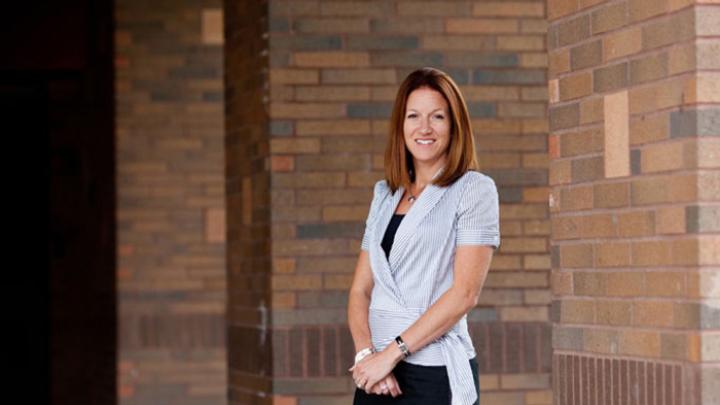
Affiliation: Alumna
Program: EdD, Educational Administration
Research Interests: Regulation techniques for students on and off the autism spectrum, implementing interventions to increase student engagement, and increasing rigor without increasing student anxiety
In 2006, 12 years after enrolling at Warner, Kathryn Colicchio got called to the main office at East High School, where she was working at the time as an administrator. There waiting for her was Brian Brent, Warner’s associate dean for graduate studies. The unannounced visit was an attempt to persuade Colicchio, who had finished her coursework nearly a decade earlier, to finish her dissertation.
“He was caring enough to come find me and say, ‘If you stick with this, I promise we’ll get you through,’” recalls Colicchio, who had to repeatedly postpone her dissertation because she had the good fortune of being continuously promoted over the years, which meant longer work hours. The “intervention,” as she calls it, worked. Two years later, she earned her EdD in educational leadership.
As the newly hired executive director of teaching, learning, and student support services for the East Rochester Union Free School District, Colicchio plans to increase student achievement through a multi-layered approach of applying interventions based on student need, which she accomplished at her last job as director of secondary education for the Lyndonville Central School District in Orleans County. The former teacher favors a Response-to-Intervention model that personalizes instruction and pushes educators to think outside the box. She also expects to work closely with teachers, counselors, and administrators to sustain an environment of excellence and equity for all students.
A top priority will be employing an ongoing data analysis process that tracks each student’s skills and weaknesses, to ensure delivery of a truly individualized, yet balanced, instructional program.
“There’s not one cookie-cutter solution in education,” she explains. “Warner teaches you how to go through the steps of the decision-making process where you examine alternatives, consult various stakeholders, and evaluate the information at hand before making a final decision.
“And that’s really important in education,” she continues. “There are no right or wrong answers. There are just the best decisions for your organization.”
Colicchio’s network has grown greatly from her Warner experience—a group she describes as a powerful support system in a profession that often leaves little time for building outside professional relationships.
And, Warner has remained close in other ways, recently asking Colicchio and other graduates for their opinions at a Leadership Advisory Committee meeting.
“It’s great that they’ve been as committed to me as I was to them,” she says.